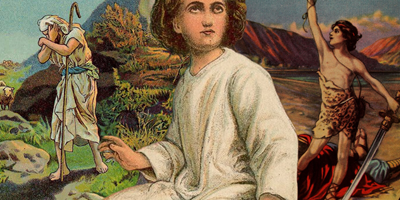We have seen that the God presented in Scripture is in a completely different category to the gods of the nations, because the Bible presents Him as a God who existed eternally. We also saw that the plurality of persons within His being means He accounts for reality. In our last article I tried to show that He is distinct culturally – He didn’t follow the morals of the culture. In this article I want to point out another distinctive feature of Israel’s God:
The God of Israel intervened historically
I was helping out recently at a Bible exhibition in a school, and one of the young people asked me, “Why was the Bible written?” That is a question that can be answered in various ways. One way is to look at it from the divine side and say the Bible was written because the Holy Spirit guided people to write (2 Peter 1:21), but another way is to look at it from the human side – the Bible was written because people were recording what God was doing in the world. The Bible is a record of God’s actions in history (and how we should live in the light of those actions). The God presented in the Bible is a God who is both transcendent (i.e., He is not part of our universe) and immanent (i.e., He is present and acts within the universe) – He is not part of creation but He takes part in it. He’s not locked into it, but He isn’t locked out of it either – He is free to act in it if and when He chooses.
The gods of the nations are connected with myths and legends – the stories of their exploits occurred once upon a time in a location unknown and weren’t ever intended to be accounts of real history. In contrast, the accounts of Yahweh’s actions throughout the Old Testament were very definitely to be taken as real history. He was said to have acted in certain places at certain times, and the historicity of many of these events can be corroborated archeologically (e.g., the destruction of Sodom and Gomorrah, the exodus, the conquest of Canaan).
But the greatest intervention of God occurred at the incarnation. The incarnation refers to the event of the Son of God taking a human nature, becoming a man and living amongst His creatures.
So, did it happen? Has God shown up in the world? Let’s consider one line of evidence.
The fact that Jesus performed miracles is well-established, not only by multiple eye-witness accounts both friendly and hostile, both inside and outside the Bible, but also by common sense – why did anyone believe Jesus was the Messiah when He didn’t do anything the Jews at that time expected the Messiah to do? He wasn’t a military leader who would evict the Romans and liberate Israel, and yet there were many Jews who believed He was the Messiah. This has resulted in a near-universal consensus among historians (no matter their worldview) that the ministry of Jesus of Nazareth was marked by miracles. As one radically sceptical scholar, Marcus Borg, put it, “despite the difficulty which miracles pose for the modern mind, on historical grounds it is virtually indisputable that Jesus was a healer and exorcist.”
The only reason people believed He was the Messiah during His life was because He claimed it and did miracles to vindicate that claim, and the only reason people continued to believe it after His shameful death was because of His resurrection. But the thing is, the Old Testament prophesied that the Messiah would be none less than God Himself (e.g., Isaiah 9:6; 35:4-6), and that’s who Jesus claimed to be. That’s who the evidence proclaims Him to be.
So, as we come to Christmas and think about the birth of the baby in the manger, we are thinking about the biggest ever intervention of God into the world, and the evidence can be examined. There is nothing like this with any other so-called deity.
The God of the Bible continues to intervene in the world every single day, but that will be the focus of our final article in this series.






























